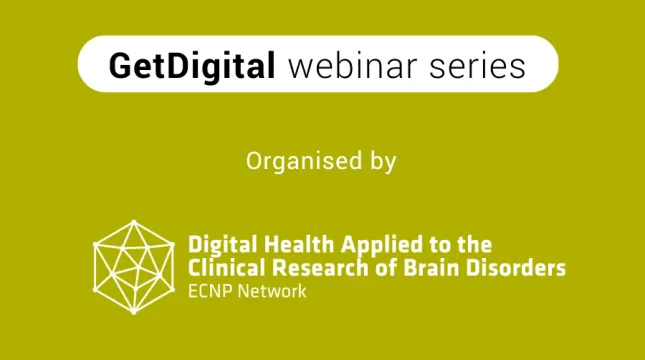This webinar by Gerard Anmella, Spain, and Clara Molins Rosés, Spain, is part of the GetDigital webinar series, organised by the ECNP Digital Health Network.
Language analysis in psychiatry: application of novel techniques.
Language, expressed through speech, offers a unique and privileged window into the workings of the human mind. It serves as the foundation for inferring others’ thought processes and is therefore a cornerstone of psychiatric evaluation. In clinical interviews, speech features are routinely assessed, though this is often done subjectively. These features include:
- Acoustic characteristics (e.g., tone, volume, prosody, intonation)
- Formal aspects (e.g., organization, flow, fluency, rhythm, quantity, latency)
- Language content (e.g., coherence, cognitions, delusions, obsessions)
Emotionality (e.g., expressed feelings, affective tone)
Natural language processing (NLP), a branch of artificial intelligence, enables machines to understand, interpret, and generate human language. Over recent decades, the application of NLP techniques to analyze speech patterns in psychiatric disorders has grown significantly.
Bipolar Disorder (BD) and Speech Patterns
Bipolar disorder is characterized by significant shifts in mood and energy, which are often reflected in speech patterns. These patterns are crucial for diagnosis and monitoring but are currently assessed subjectively. Advances in NLP provide an opportunity to analyze these patterns objectively.
Gerard Anmella will present a study (https://www.mdpi.com/2077-0383/13/17/4997) on the application of speech analysis to bipolar disorder, based on the following aims:
Correlating speech features with the severity of manic and depressive symptoms in BD. Developing predictive models for diagnostic and treatment outcomes. Identifying the most relevant speech features and tasks for effective analysis.
Cognitive Distortions and Psycholinguistic Analysis
Cognitive distortions, also referred to as cognitive errors or thinking traps, involve biased interpretations of events or errors in processing information. These distortions systematically skew an individual’s perception of their experiences and are commonly observed in individuals with depressive and anxiety disorders.
Clara Molins Rosés will present a study focusing on structural and emotional patterns in cognitive distortions, utilizing cognitive network science and NLP. This psycholinguistic approach explores:
The mental processes underpinning of cognitive distortions.
The cognitive restructuring process.
This work aims to deepen our understanding of the interaction between language and mental health, providing a basis for innovative tools for diagnosis, monitoring and treatment.
The zoom link to join the webinar will appear on this page 10 minutes before the webinar begins. Please return to this page to join.
About the GetDigital webinar series
Digital approaches are fundamentally changing traditional ways of diagnosis, monitoring, management, and treatment of brain disorders worldwide. GetDigital is a webinar series on mHealth organised by the ECNP Digital Health Applied to the Clinical Research of Brain Disorders Network.
This online series aim at sharing and distributing new and high-quality research to researchers and clinicians, educating Early Career Scientists across Europe, and foster collaborations across research groups.
Explore the GetDigital series here.
By registering, you consent to the sharing of your e-mail address with the GetDigital webinar organisers.


